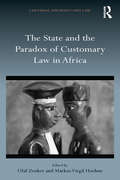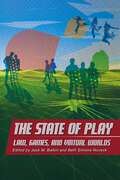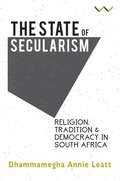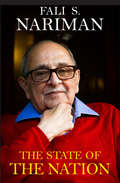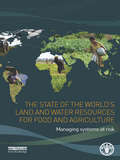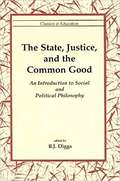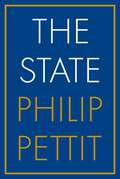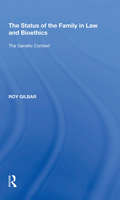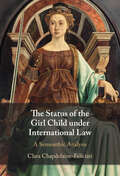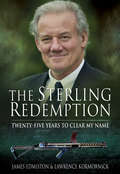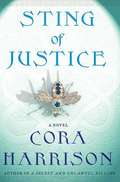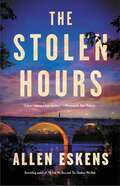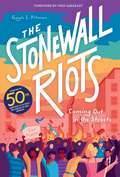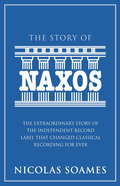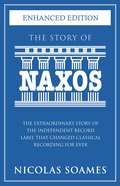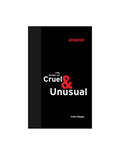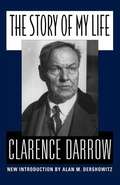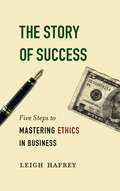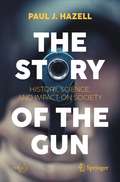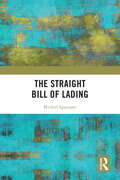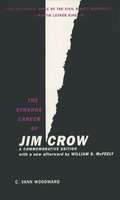- Table View
- List View
The State and the Paradox of Customary Law in Africa (Cultural Diversity and Law)
by Olaf Zenker Markus Virgil HoehneCustomary law and traditional authorities continue to play highly complex and contested roles in contemporary African states. Reversing the common preoccupation with studying the impact of the post/colonial state on customary regimes, this volume analyses how the interactions between state and non-state normative orders have shaped the everyday practices of the state. It argues that, in their daily work, local officials are confronted with a paradox of customary law: operating under politico-legal pluralism and limited state capacity, bureaucrats must often, paradoxically, deal with custom – even though the form and logic of customary rule is not easily compatible and frequently incommensurable with the form and logic of the state – in order to do their work as a state. Given the self-contradictory nature of this endeavour, officials end up processing, rather than solving, this paradox in multiple, inconsistent and piecemeal ways. Assembling inventive case studies on state-driven land reforms in South Africa and Tanzania, the police in Mozambique, witchcraft in southern Sudan, constitutional reform in South Sudan, Guinea’s long durée of changing state engagements with custom, and hybrid political orders in Somaliland, this volume offers important insights into the divergent strategies used by African officials in handling this paradox of customary law and, somehow, getting their work done.
The State of Play: Law, Games, and Virtual Worlds (Ex Machina: Law, Technology, and Society #2)
by Beth Simone Noveck Jack M. BalkinThe State of Play presents an essential first step in understanding how new digital worlds will change the future of our universe. Millions of people around the world inhabit virtual words: multiplayer online games where characters live, love, buy, trade, cheat, steal, and have every possible kind of adventure. Far more complicated and sophisticated than early video games, people now spend countless hours in virtual universes like Second Life and Star Wars Galaxies not to shoot space invaders but to create new identities, fall in love, build cities, make rules, and break them.As digital worlds become increasingly powerful and lifelike, people will employ them for countless real-world purposes, including commerce, education, medicine, law enforcement, and military training. Inevitably, real-world law will regulate them. But should virtual worlds be fully integrated into our real-world legal system or should they be treated as separate jurisdictions with their own forms of dispute resolution? What rules should govern virtual communities? Should the law step in to protect property rights when virtual items are destroyed or stolen?These questions, and many more, are considered in The State of Play, where legal experts, game designers, and policymakers explore the boundaries of free speech, intellectual property, and creativity in virtual worlds. The essays explore both the emergence of law in multiplayer online games and how we can use virtual worlds to study real-world social interactions and test real-world laws.Contributors include: Jack M. Balkin, Richard A. Bartle, Yochai Benkler, Caroline Bradley, Edward Castronova, Susan P. Crawford, Julian Dibbell, A. Michael Froomkin, James Grimmelmann, David R. Johnson, Dan Hunter, Raph Koster, F. Gregory Lastowka, Beth Simone Noveck, Cory Ondrejka, Tracy Spaight, and Tal Zarsky.
The State of Secularism: Religion, Tradition and Democracy in South Africa
by Dhammamegha Annie LeattA history of global political secularism comparing religion and traditional authority in apartheid South Africa. The Dutch Reformed Church, it was said in apartheid South Africa, was the National Party at prayer, and indeed, given that the Bible was so fundamental to much of the legislation that governed the apartheid state, that apparently satirical description had the ring of truth. 'Religion in South Africa's past', writes Dhammamegha Annie Leatt has been 'saturated by politics' and politics 'saturated by religion'. So how, she asks, was it possible for a new state to found itself without religious authority? Why did the churches give up so much of their political role in the transition? How can we think about tradition and the customary in relation to secularism? How can we not? In The State of Secularism Leatt guides the reader from a history of global political secularism through an exploration of the roles played by religion and traditional authority in apartheid South Africa to the position of religion in the post-apartheid state. She analyses the negotiations relating to religion in the constitution-making process, arguing, that South Africa is both secular in its Constitution and judicial foundations and increasingly non-secular in its embrace of traditional authorities and customary law. In the final chapter Leatt turns her attention to post-apartheid South Africa, examining changing relationships between churches and the ruling African National Congress and the increasing influence of traditional leaders and evangelical Christians in an anti-liberal alliance. This book makes a tremendous contribution to the literature on postcolonial politics on the African continent. It has wonderful insights into the founding of a constitutional democracy in South African and will appeal to students in history, politics, sociology and anthropology and constitutional law.
The State of the Nation
by Fali S. NarimanA definitive, analytical and meticulous account of the present state of the nation – from a constitutional perspective – by one of India’s most respected legal luminaries An ardent defender of the Constitution of India, Fali Nariman has today attained the status of an outstanding lawyer who strongly believes in the rule of the law and stands by his convictions. In this timely volume, the author highlights crucial issues that the legislature, the executive, judiciary, the bar and the common people have to deal with virtually on a day-to-day basis. His main focus is on corruption at various levels and in ‘hallowed’ institutions, including the judiciary. The author contends that the legislative and executive wings of the government – the elected representatives of the people – were (and are) expected to provide for the welfare of the people. He points out that they have failed miserably simply because making of laws is not enough; applying and enforcing laws – which are also the primary duties of the government – have left much to be desired. Consequently, it is the judiciary that tells the government when and how to distribute excess food, what crops to grow and what not to grow, which economic projects are good for the country and which are not, and what fuel should be used in our vehicles and whether 2G/3G licences should be allotted only through auctions! The judiciary is hence accused of overreach! The contents also throw light on other important subjects such as: the implications of reservations for certain sections of the population (including minorities); the true purpose and significance of the Constitution; Centre–State relations; and whether the Constitution has benefited the common people over the years. This is a book that is absorbing as well as thought-provoking that will make the readers put on their thinking caps.
The State of the World's Land and Water Resources for Food and Agriculture: Managing Systems at Risk
by Food and of the United NationsThe State of the World's Land and Water Resources for Food and Agriculture is FAO's first flagship publication on the global status of land and water resources. It is an 'advocacy' report, to be published every three to five years, and targeted at senior level decision makers in agriculture as well as in other sectors. SOLAW is aimed at sensitizing its target audience on the status of land resources at global and regional levels and FAO's viewpoint on appropriate recommendations for policy formulation. SOLAW focuses on these key dimensions of analysis: (i) quantity, quality of land and water resources, (ii) the rate of use and sustainable management of these resources in the context of relevant socio-economic driving factors and concerns, including food security and poverty, and climate change. This is the first time that a global, baseline status report on land and water resources has been made. It is based on several global spatial databases (e.g. land suitability for agriculture, land use and management, land and water degradation and depletion) for which FAO is the world-recognized data source. Topical and emerging issues on land and water are dealt with in an integrated rather than sectoral manner. The implications of the status and trends are used to advocate remedial interventions which are tailored to major farming systems within different geographic regions.
The State, Justice, and the Common Good: An Introduction to Social and Political Philosophy
by B. J. DiggsThe State, Justice, and the Common Good An Introduction to Social and Political Philosophy
The State: Normative Analysis Of The State
by Philip PettitA major new account of the state and its importance by a leading political philosopherThe future of our species depends on the state. Can states resist corporate capture, religious zealotry, and nationalist mania? Can they find a way to work together so that the earth heals and its peoples prosper? Or is the state just not up to the task? In this book, the prominent political philosopher Philip Pettit examines the nature of the state and its capacity to serve goals like peace and justice within and beyond its borders. In doing so, he breaks new ground by making the state the focus of political theory—with implications for economic, legal, and social theory—and presents a persuasive, historically informed image of an institution that lies at the center of our lives.Offering an account that is more realist than utopian, Pettit starts from the function the polity is meant to serve, looks at how it can best discharge that function, and explores its ability to engage beneficially in the life of its citizens. This enables him to identify an ideal of statehood that is a precondition of justice. Only if states approximate this functional ideal will they be able to deal with the perennial problems of extreme poverty and bitter discord as well as the challenges that loom over the coming centuries, including climate change, population growth, and nuclear arms.
The Status of Law in World Society
by Friedrich KratochwilFriedrich Kratochwil's book explores the role of law in the international arena and the key discourses surrounding it. It explains the increased importance of law for politics, from law-fare to the judicialization of politics, to human rights, and why traditional expectations of progress through law have led to disappointment. Providing an overview of the debates in legal theory, philosophy, international law and international organizations, Kratochwil reflects on the need to break down disciplinary boundaries and address important issues in both international relations and international law, including deformalization, fragmentation, the role of legal pluralism, the emergence of autonomous autopoietic systems and the appearance of non-territorial forms of empire. He argues that the pretensions of a positivist theory in social science and of positivism in law are inappropriate for understanding practical problems and formulates an approach for the analysis of praxis based on constructivism and pragmatism.
The Status of the Family in Law and Bioethics: The Genetic Context
by Roy GilbarWhere do a doctor's responsibilities lie in communicating diagnostic and predictive genetic information to a patient's family members? On the one hand, a patient may wish to retain confidentiality while the relatives seek information; on the other, a patient may wish to share the information while the relatives would rather not know. This volume investigates the doctor's professional legal and ethical obligations in the context of these two familial tensions. The examination is conducted within the liberal-communitarian debate, whereby the two philosophies hold different perceptions of the individual and the relationship he or she has with others. Within this theoretical framework, the book examines the approach taken by English medical law and ethics to the communication of genetic information to family members. Legally, the focus is on tort law and the law of confidentiality. Ethically, it concentrates on the approach taken by the bioethical literature, and more specifically by codes of ethics and professional guidelines.
The Status of the Girl Child under International Law: A Semioethic Analysis
by Clara Chapdelaine-FeliciatiClara Chapdelaine-Feliciati offers the first comprehensive study of the status of the girl child under international law. This book significantly contributes to bridging two fields usually studied separately: law and semiotics. The author engages in the novel legal semiotics theory to decode the meaning of international treaties (mainly the Convention on the Rights of the Child, Convention on the Elimination of All Forms of Discrimination Against Women, and International Covenants) and assess whether the provisions, as formulated, clearly identify the girl child and take into account the obstacles she faces as a result of sexism, childism, and intersectional discrimination. This is also the first book to apply The Significs Meaning Triad – Sense, Meaning, Significance – in international law, and Semioethics for both a diagnosis and prognosis of problematic signs in view of modifying the wording of relevant treaties.
The Sterling Redemption: Twenty-Five Years to Clear My Name
by James Edmiston Lawrence KormornickThe fight against a false accusation in the Arms-to-Iraq affair. &“A searing expose of one of the most shameful and cynical prosecutions of modern times.&” —The Guardian This is the untold true story of James Edmiston who suffered an extraordinary miscarriage of justice in 1983 when senior officials blocked vital witnesses coming to his trial which led to a personal tragedy; a broken marriage, and the loss of a business. The book explains how he was wrongly charged with alleged illegal exports to Iraq, and then took on the establishment against seemingly impossible odds for twenty-five years, to establish his innocence and to win record compensation from the British government in a truly remarkable case. Divorced and bankrupted, he is now rebuilding a shattered life, nearly thirty years later. This extraordinary story is a fascinating insight into government and the abuse of power and is based on many original sources including the Scott Report and Judgment of the Court of Appeal (criminal). The co-author, Lawrence Kormornick, is a Solicitor-Advocate (civil) who has represented Edmiston and several other victims of the Arms-to-Iraq prosecution scandal against the government and has a unique insight into these cases. Packed with ironies, twists of fate, and many unanswered questions it is a compelling read for anyone interested in political intrigue and abuse of power, miscarriage of justice, and learning about how an individual took on the state and won. &“A true story of alleged skulduggery and, possibly, criminal acts in the form of perverting the course of justice by the authorities and it should be bedside reading for everybody who believes in the rule of law.&” —The Law Society Gazette
The Sting of Justice: A Mystery of Medieval Ireland (Burren Mysteries #3)
by Cora HarrisonThe year is 1509 and autumn has come to western Ireland. When Mara attends the funeral of a local priest, the last thing she expects to discover is a corpse on the church steps. As Mara investigates, she is determined to bring a killer to justice.
The Stolen Hours
by Allen EskensA woman finds herself in a race not only for justice but for her life in this "riveting, hold-your-breath" new mystery from the bestselling author of The Life We Bury (Karin Slaughter, New York Times bestselling author of The Silent Wife).Lila Nash is on the verge of landing her dream job—working as a prosecutor under the Hennepin County Attorney—and has settled into a happy life with her boyfriend, Joe Talbert. But when a woman is pulled from the Mississippi River, barely alive, things in the office take a personal turn. The police believe the woman&’s assailant is local photographer Gavin Spenser, but the case quickly flounders as the evidence wears thin. It seems Gavin saw this investigation coming—and no one can imagine how carefully he has prepared.The more determined Lila is to put Gavin behind bars, the more elusive justice becomes. Battling a vindictive new boss and haunted by the ghosts of her own unspeakable attack, which she&’s kept a dark secret for eight long years, Lila knows the clock is ticking down. In a race against an evil mastermind, it will take everything Lila&’s got to outsmart a killer—and to escape the dark hold of her own past.&“In The Stolen Hours, there&’s not a moment misplaced or a second lost. With the precision of a watchmaker, Eskens assembles the fine parts of a mystery and sets them to the tempo of a thriller, leaving the reader breathless.&” —Craig Johnson, author of the Walt Longmire Mysteries
The Stonewall Riots: Coming out in the Streets
by Gayle E. PitmanThis book is about the stonewall riots, a series of spontaneous, often violent demonstrations by members of the gay (lgbtq+) community in reaction to a police raid that took place in the early morning hours of June 28, 1969, at the stonewall inn in the Greenwich village neighbourhood of Manhattan, new York City. The riots are attributed as the Spark that ignited the lgbtq+ movement. The author describes American gay history leading up to the riots, the riots themselves, and the aftermath, and includes her interviews of people involved or witnesses, including a woman who was ten at the time. Profusely illustrated, the book includes contemporary photos, newspaper clippings, and other period objects. A timely and necessary read, the stonewall riots helps readers to understand the history and legacy of the lgbtq+ movement.
The Story Of Naxos: The Extraordinary Story of the Independent Record Label that Changed Classical Recording for Ever
by Nicolas SoamesIn 1987, a budget classical record label was started in Hong Kong by Klaus Heymann, a German businessman who loved classical music. Swiftly, it gained a world wide reputation for reliable new digital recordings of the classics at a remarkably low price. Despite opposition from the classical record establishment, it grew at a remarkable pace, and soon expanded into opera, early music, contemporary music and specialist repertoire so that it became appreciated by specialist collectors as well as the general music lover. It is now the leading provider of classical music and as an innovator in digital delivery. At the heart of Naxos is one man: Klaus Heymann. The combination of his broad knowledge of classical music and his acute business acumen has enabled him to build the most varied classical music label in the world, but also the most effective distribution network to ensure that his recordings are available everywhere. This fascinating story explains how it happened, how a one-time tennis coach in Frankfurt became a classical recording mogul in Hong Kong and how, at the age of 75, he still holds the reins as firmly as ever.
The Story Of Naxos: The extraordinary story of the independent record label that changed classical recording for ever
by Nicolas SoamesIn 1987, a budget classical record label was started in Hong Kong by Klaus Heymann, a German businessman who loved classical music. Swiftly, it gained a world wide reputation for reliable new digital recordings of the classics at a remarkably low price. Despite opposition from the classical record establishment, it grew at a remarkable pace, and soon expanded into opera, early music, contemporary music and specialist repertoire so that it became appreciated by specialist collectors as well as the general music lover. It is now the leading provider of classical music and as an innovator in digital delivery. At the heart of Naxos is one man: Klaus Heymann. The combination of his broad knowledge of classical music and his acute business acumen has enabled him to build the most varied classical music label in the world, but also the most effective distribution network to ensure that his recordings are available everywhere. This fascinating story explains how it happened, how a one-time tennis coach in Frankfurt became a classical recording mogul in Hong Kong and how, at the age of 75, he still holds the reins as firmly as ever.
The Story Of Naxos: The extraordinary story of the independent record label that changed classical recording for ever
by Nicolas SoamesIn 1987, a budget classical record label was started in Hong Kong by Klaus Heymann, a German businessman who loved classical music. Swiftly, it gained a world wide reputation for reliable new digital recordings of the classics at a remarkably low price. Despite opposition from the classical record establishment, it grew at a remarkable pace, and soon expanded into opera, early music, contemporary music and specialist repertoire so that it became appreciated by specialist collectors as well as the general music lover. It is now the leading provider of classical music and as an innovator in digital delivery. At the heart of Naxos is one man: Klaus Heymann. The combination of his broad knowledge of classical music and his acute business acumen has enabled him to build the most varied classical music label in the world, but also the most effective distribution network to ensure that his recordings are available everywhere. This fascinating story explains how it happened, how a one-time tennis coach in Frankfurt became a classical recording mogul in Hong Kong and how, at the age of 75, he still holds the reins as firmly as ever.
The Story of Child Labor Laws (Cornerstones of Freedom)
by R. Conrad SteinTraces the history of laws that were passed during the early twentieth century to end the exploitation of child laborers that had been widespread since the beginning of the industrial revolution.
The Story of Cruel and Unusual (Boston Review)
by Colin DayanA searing indictment of the American penal system that finds the roots of the recent prisoner abuse at Abu Ghraib and Guantánamo in the steady dismantling of the Eighth Amendment's prohibition of "cruel and unusual" punishment. The revelations of prisoner abuse and torture at Abu Ghraib and more recently at Guantánamo were shocking to most Americans. And those who condemned the treatment of prisoners abroad have focused on U.S. military procedures and abuses of executive powers in the war on terror, or, more specifically, on the now-famous White House legal counsel memos on the acceptable limits of torture. But in The Story of Cruel and Unusual, Colin Dayan argues that anyone who has followed U.S. Supreme Court decisions regarding the Eighth Amendment prohibition of "cruel and unusual" punishment would recognize the prisoners' treatment at Abu Ghraib and Guantánamo as a natural extension of the language of our courts and practices in U.S. prisons. In fact, it was no coincidence that White House legal counsel referred to a series of Supreme Court decisions in the 1980s and 1990s in making its case for torture. Dayan traces the roots of "acceptable" torture to slave codes of the nineteenth century that deeply embedded the dehumanization of the incarcerated in our legal system. Although the Eighth Amendment was interpreted generously during the prisoners' rights movement of the late 1960s and 1970s, this period of judicial concern was an anomaly. Over the last thirty years, Supreme Court decisions have once again dismantled Eighth Amendment protections and rendered such words as "cruel" and "inhuman" meaningless when applied to conditions of confinement and treatment during detention. Prisoners' actual pain and suffering have been explained away in a rhetorical haze—with rationalizations, for example, that measure cruelty not by the pain or suffering inflicted, but by the intent of the person who inflicted it. The Story of Cruel and Unusual is a stunningly original work of legal scholarship, and a searing indictment of the U.S. penal system.
The Story of My Life
by Clarence S. DarrowThe Story of My Life recounts, and reflects on, Clarence Darrow's more than fifty years as a corporate, labor, and criminal lawyer, including the most celebrated and notorious cases of his day: establishing the legal right of a union to strike in the Woodworkers' Conspiracy Case; exposing, on behalf of the United Mine Workers, the shocking conditions in the mines and the widespread use of child labor; defending Leopold and Loeb in the Chicago "thrill" murder case; defending a teacher's right to present the Darwinian theory of evolution in the famous Scopes trial; fighting racial hatred in the Sweet anti-Negro and the Scottsboro cases; and much more. Written in his disarming, conversational style, and full of refreshingly relevant views on capital punishment, civil liberties, and the judicial system, Darrow's autobiography is a fitting final summation of a remarkable life.
The Story of Success
by Leigh HafreyAn innovative business book positioning ethical practice as the cornerstone of success"Business ethics? Isn't that an oxymoron?" As a lecturer in ethics, communication, and leadership at MIT's Sloan School of Management and a moderator of the Aspen Executive Seminar, Leigh Hafrey has heard time and again that ethics and business don't mix. In The Story of Success: Five Steps to Mastering Ethics in Business, Hafrey draws on fifteen years of conversations with businesspeople at all stages of their careers, from MBA to Chairman of the Board, to articulate five steps that generate ethical practice:1. Speak Up, Speak Out: define your managerial style2. See the Big Picture: recognize the forces that affect your practice3. Break the Rules, Make the Rules, Absorb the Costs: drive change, and know it4. Tell Good Stories: find stories that bring out the best in your people and yourself5. Test for Truth: distinguish fact from fantasy in your story-tellingHafrey illustrates these five steps through contemporary books and movies: to show how we elaborate a managerial style from early childhood, he discusses adult readings of Du Bose Heyward's classic children's tale, The Country Bunny and the Little Gold Shoes; to explain professional standards, he quotes Chinese MBA's on the warrior code of characters in Ang Lee's Academy Award-winning film Crouching Tiger, Hidden Dragon. Hafrey juxtaposes these reports with real-life businesspeople' s stories of career challenge and personal success, and speculates on the way in which American business values increasingly shape and will be shaped by global culture.
The Story of the Gun: History, Science, and Impact on Society (Springer Praxis Books)
by Paul J. HazellThis engaging and accessible book explains the scientific principles behind guns, both ancient and modern. It connects their evolution to advances in science, as well as tracing the developments of projectiles and propellants. It is not limited to small arms but also looks at the science of enormous guns such the Paris Gun, for example, and reviews the efforts to build a gun to launch projectiles into space. Extremely fast guns are also covered, such as two-stage guns and rail guns. Further, the book provides insight into the science of terminal ballistics and wound ballistics as well as the challenging subject of gun control. It is full of interesting facts for all who are curious about the science and history of guns, as well as those for whom the gun is an accessory of their profession.
The Story of the Powers of the Supreme Court (Cornerstones of Freedom)
by R. Conrad SteinA brief overview explaining how the Supreme Court is the ultimate interpreter of our Constitution.
The Straight Bill of Lading
by Michiel SpanjaartThe bill of lading has been the subject of numerous articles, dissertations, and textbooks over the years, and this is hardly surprising. The bill of lading has a fascinating history, it has several functions with roots in both contract and property law, and its issuance may trigger the application of an international convention on the carriage of goods by sea, the Hague–Visby Rules. Whereas most books on the subject deal with the bill of lading in general, this book zooms in on the straight bill of lading and covers the differences (and similarities) with a negotiable (order or bearer) bill of lading.
The Strange Career of Jim Crow
by C. Vann Woodward William S. McFeely (afterword]C. Vann Woodward, who died in 1999 at the age of 91, was America's most eminent Southern historian, the winner of a Pulitzer Prize for Mary Chestnut's Civil War and a Bancroft Prize for The Origins of the New South. Now, to honor his long and truly distinguished career, Oxford is pleased to publish this special commemorative edition of Woodward's most influential work, The Strange Career of Jim Crow. The Strange Career of Jim Crow is one of the great works of Southern history. Indeed, the book actually helped shape that history. Published in 1955, a year after the Supreme Court in Brown v. Board of Education ordered schools desegregated, Strange Career was cited so often to counter arguments for segregation that Martin Luther King, Jr. called it "the historical Bible of the civil rights movement. " The book offers a clear and illuminating analysis of the history of Jim Crow laws, presenting evidence that segregation in the South dated only to the 1890s. Woodward convincingly shows that, even under slavery, the two races had not been divided as they were under the Jim Crow laws of the 1890s. In fact, during Reconstruction, there was considerable economic and political mixing of the races. The segregating of the races was a relative newcomer to the region. Hailed as one of the top 100 nonfiction works of the twentieth century, The Strange Career of Jim Crow has sold almost a million copies and remains, in the words of David Herbert Donald, "a landmark in the history of American race relations. "
